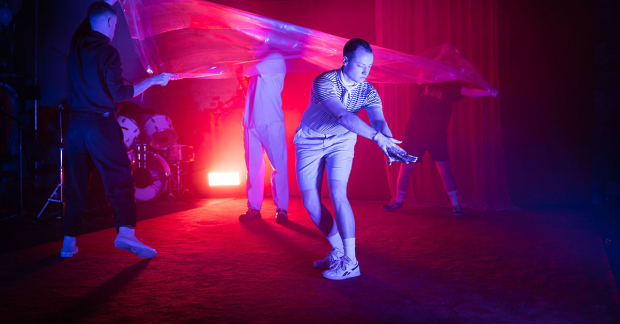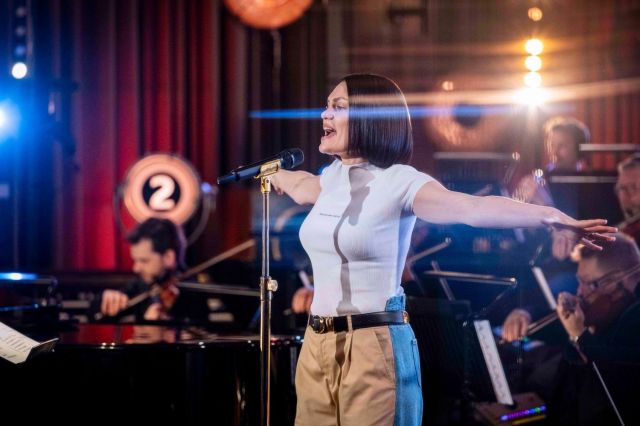Review: And The Rest of Me Floats (Bush Theatre)
Outbox Theatre’s devised piece about gender based upon the performers’ own lives

© Helen Murray
Seven performers from the non-binary, trans and queer community enter the stage in perfect silence. They watch the audience and are watched by the audience for an uncomfortably long length of time. Finally, the audience begins to titter nervously. It's a simple, understated entrance – using gaze and reverse gaze that is at once voyeuristic and empowering for each performer. They are the ones in control here. What follows is a lyrical performance that combines monologues based upon the performers' own lives, live music and movement in a celebration of gender expression.
There's ample space on the stage but the show doesn't drown in it at all. Instead Rūta Irbīte's design has two long railings filled with a variety of clothes. Clothing (and its lack thereof) plays a huge part in the performance, such as in one scene where performer Josh-Susan Enright dresses Emily Joh Miller in dresses and scarves. Miller discards each of these items, before choosing an outfit which fits her chosen mode of expression.
The idea of gaze and scrutiny glimpsed in the opening scene returns later on in the show, when the performers remove their clothes in darkness. Michelle Tiwo holds the power in this scene, shining a torch at each of the bodies in the space. Each performer cringes away and attempts to cover their nakedness. It's an uncomfortable scene, well directed by Ben Buratta, which brings to light questions of invasive procedures, and the barrage of intrusive questions. Questions that are delivered in a verbal onslaught in later scenes – "Should you be on medication?", "How do you feel?", "Who is the man in the relationship?" and on and on and on.
Whilst the show's content touches upon the idea of interrogation, the form of the show is actually much more gentle. Transitions blur into one another and the performers share the space willingly, allowing each personal monologue to take centre stage, so that real moments of intimate confession to the audience are achieved.
One such arresting monologue is Tiwo's, as she talks about the devastating pressure of gender norms, recounting an experience with a lover who was waiting for her to 'play the man' and 'take charge'. By the end, Tiwo tells us that wasn't what she wanted – that she was just ‘looking for some tenderness.' Meanwhile, Elijah W Harris struggles to speak to his mum about his sexual preferences. Another monologue that packs a powerful punch is performed by Enright, who dons a skin-tight red dress over his/her otherwise naked body. She/he gives us a moment to take it all in, to notice the form-hugging dress, then asks us whether we truly see him/her. Beyond the clothing, beyond our expectations of gender, beyond his appearance…do we truly see the person beneath all of that?
Cultural identity is explored alongside gender, which comes nicely to a head in a scene in which Tamir Amar Pettet must practice their prayer for their upcoming Bar Mitzvah – a prayer which the Rabbi (played by Miller), makes him repeat without mercy. Overlapping is a story about a performer Barry Fitzgerald, whose own dad refused to acknowledge his gender expression as a child, played simultaneously against Tiwo and Yasmin Zadeh's reenactments of their frustrations with religious attitudes towards gender norms.
The show ends on a high note, with stand-up comedy, a big dance party and the opportunity for the audience to share their own coming out stories. Importantly, Miller states that she often feels watched, but that the audience are now helping her feel seen.



















